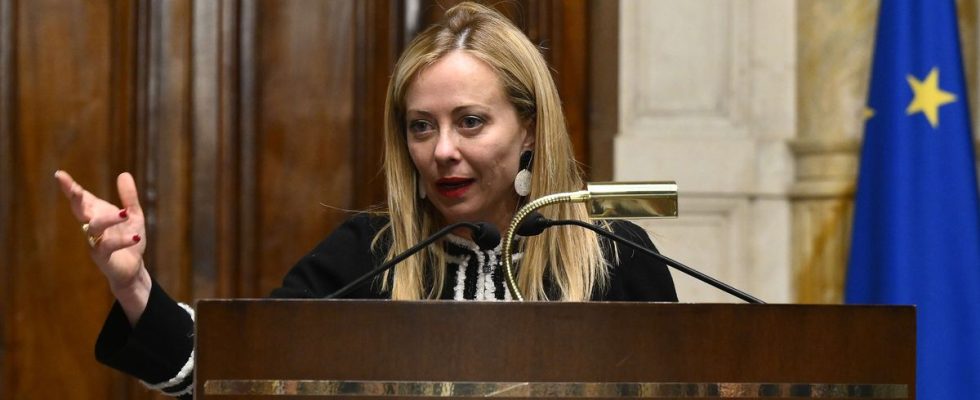The Fifth Republic still makes people dream, at least on the other side of the Alps. On Tuesday, Italian Prime Minister Giorgia Meloni launched a party round to present her constitutional reform project, for which she believes she has “the mandate of the Italians”. The post-fascist leader wishes, in a country known for its political instability, to strengthen the powers of the executive, and pleads for a French-style system, in which the President of the Republic would be elected by universal suffrage.
Inevitably, a nostalgic of Mussolini who wishes to concentrate more powers in the hands of a single person, it has something to tickle. “It’s risky,” concedes bluntly Camille Bedock, researcher in political science at the CNRS, interviewed by 20 minutes. Even the French system taken as an example by the far-right leader is even “a reason to be on guard against our own system”, she underlines.
The price of French stability
What makes Meloni and the Italians dream so much about the French Constitution? To understand this, we have to go back to the aftermath of the Second World War. In victorious democracies, parliamentarianism is on the rise. But Italy and the Fourth Republic will quickly suffer from chronic instability, with Chambers without a clear majority, coalitions that come and go. At the height of the crisis in Algeria, France will then change its regime, and opt for a strong man, General de Gaulle. “France is seen as a country that had unstable institutions and managed to find stability,” explains Camille Bedock.
A success envied by the Italian cousin, who “is in the 68th government since the end of the war”, 78 years ago, counts Marie-Claire Ponthoreau, professor of public law at the University of Bordeaux. The Italians are tempted by “an efficiency that they don’t have”, she adds. But “we see the price to pay for stability in terms of representativeness, risks of abuse” with the current political crisis in France, warns Camille Bedock. “We are at the limits of the system”, adds Marie-Claire Ponthoreau, according to whom “we have elements in France which could suggest that authoritarianism could develop” in the Italian context.
An impossible reform?
Giorgia Meloni is surfing on an old Italian fantasy, which dates “at least from the end of the 70s, even stronger since the 90s”, according to Camille Bedock. “The question of constitutional reform is a sea serpent”, explains Marie-Claire Ponthoreau. The last to be confronted with it is Matteo Renzi, president of the Council between 2014 and 2016, who had resigned after the failure of a referendum. The centre-left head of government then planned to put an end to “parity bicameralism”, where the Senate weighs as much as the Chamber of Deputies.
This inability to reform could paradoxically protect the Italian Constitution from Meloni’s ambitions. “There are plenty of steps that are not easy to take,” reassures Camille Bedock, who believes that even if the head of the far-right government steps over Parliament, “we can assume that there would be a fierce campaign by the political parties. ‘opposition’ to defeat the referendum. Besides, what text would then be presented to the Italians? Tuesday’s meeting was simply to “see what options are on the table,” says Marie-Claire Ponthoreau. Apart from Fratelli d’Italia, the election of the president is not very popular among political parties.
“Meloni’s project is not clear”
Is the transposition of the French system to Italy even possible? Unlike that of the Fourth Republic, the Italian president “is not only used to inaugurate the chrysanthemums. It is one of the institutions that works well in Italy, it plays the role of arbiter and can settle crises, ”explains the professor of public law. Moreover, “we must find a formula that respects” the power of the regions, which are much more autonomous than in France. “Meloni’s project is not clear”, slice Camille Bedock.
“If there is an agreement, it would be on strengthening the role of the head of government”, and his possible election, believes Marie-Claire Ponthoreau. “It’s premature to anticipate a Hungarian or Polish situation,” she analyzes. If a reform were approved, it would in any case not come into force until 2029, when the term of office of Sergio Mattarella, president in office, expires. Until then, it is difficult to imagine that the political landscape is the same, in this political Italy in constant recomposition.

